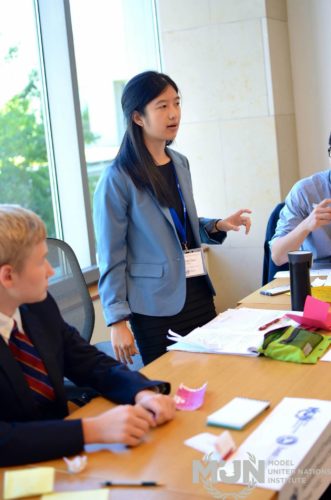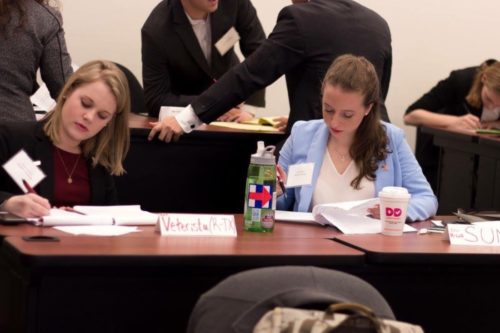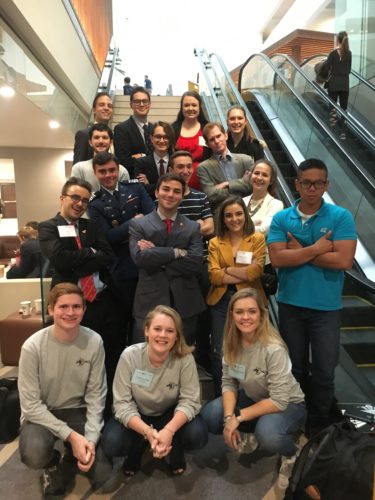Delegates in my bloc wouldn’t talk to me about substantive questions in our paper – only my male double delegate.
“While competing in a 300 person general assembly, as a small, blonde woman paired with a tall, well known and widely respected male delegate, I was frequently treated as though I had had no part in creating our working paper. Other delegates would constantly ask to speak to my partner instead of me, as if I had less authority than he did to make substantive changes to our paper. Even delegates in our own bloc, who knew that I had been highly involved in writing, asked to speak to him instead of me – about an amendment I had written.”
– Genevieve, Georgetown University/Washington, DC
I noticed patterns of awards being given based on superficial factors, rather than actual substance or diplomatic efforts.
“For some people, their greatest joy comes from the thrill of being an actor in a play, or winning a sports match with their team. For me, there is nothing I would rather do than spend my weekend giving speeches and drafting solutions to world issues with other people. I consider myself very lucky in that my MUN career so far has been colored with many positive experiences. However, my MUN journey had a very rocky start, because of factors that are entirely out of my control.
I came to this realization during my first year of Model UN. Despite putting all my effort into doing research, consistently contributing new ideas to push debate forward, and writing most of the clauses of resolutions that passed, I did not receive any recognition. Awards always went to the most attractive men, if the chair was a woman, or the most beautiful women in the room, if the chair was a man. These superficial judgments served as a driving force for me to work even harder to achieve my goals. In hindsight, I am thankful for this new energy that I found from these incidents. Because of the determination and persistence that emerged, I was able to become a competitive delegate, and the successful organizer of my school’s first ever conference. It has largely shaped who I am today, and what I currently devote my time to. At Williams College, I am the founder and coach of a MUN club at the local Mt. Greylock High School where I teach a group of wonderful students. Without these negative experiences in the beginning, it is hard to imagine if I would have come this far. I am grateful for what I have been able to accomplish as a result of them, but nobody should be put in such a position to begin with. In these situations, as a woman, I realized that the one factor within my control is how I act: although it took more effort and work, I was able to look past these injustices and continue to focus on doing what I love.”
– Audrey, Williams College/Boston

I have heard male members say they could run this club better than me because I am a woman.
“I have never been so proud of myself, nor so honored as I was when I ran and won the election for President of our Model United Nations Organization. I have been on the executive board since freshman year and have worked my butt off to get here. While I have more than proven myself, and it has taken me a while to admit that, I have heard, or heard of, a few male members of the organization say that they could run this club better than me citing that I am a female and cannot command respect that way. I have even heard them say things like ‘she cut her hair short so we would take her seriously’ or ‘if she didn’t dress that way, she would get more respect.’ When hearing this, I still struggle to walk it off and move past it but I have learned to have faith that my work speaks for itself and have grown stronger.”
– Lindsey, Elon University/North Carolina
I got told to be ‘more professional’ from a male who was threatened by me.
“When I was chosen to be part of the careers division of our MUN club, needless to say I was more than excited. I had all these plans and ideas that I wanted to implement for the good of our society, and I never expected to have to deal with so much negativity because of my gender. As soon as I joined the division, in all the meetings, this guy would constantly refer to me as ‘his secretary’, make me take minutes without asking if anyone else would want to (I was the only girl in the division) and give little to no respect to my ideas. The worst part was when during a very important meeting, for which he was late and I had to take over for him, I mentioned (playfully, and as a joke) that MUN is the ‘Coco Chanel’ of academic societies, and he kicked me under the table. I didn’t give it much thought, until I got called from our vice president and got told that there have been ‘complaints’ from my division’s supervisor, that I am not professional enough. Thankfully I proved him wrong and got promoted to general officer two months later (which means I do not have to work with him anymore!)”
-Joanna, University of Kent/England
A male leader of my club told me how to dress.
“As a freshman on my university’s Model UN team, the opinions of the members of our conferences staff and secretariat of our conferences seemed incredibly important. Therefore, it left me self-conscious and uncomfortable when an older male member of the team, on separate occasions, advised that I ‘wear a pink shirt and flirt with male delegates and the chair’ and informed me that my heels were too high, among other comments. I took these comments personally, and it led to me over-analyzing my wardrobe choices throughout my MUN career. It was demeaning and frustrating for a male in a position of power to give me MUN ‘advice’ that was really just judgements of my physical appearance.” – Genevieve, Georgetown University/Washington, DC
The male members of my bloc tried to cut me out; it was clear they weren’t complaining about my country, clauses, or ideas.
“Although I have experienced varying levels of sexism throughout my MUN career, whenever I am asked to talk about it, there is always one story I tell – mostly because I am still in disbelief this even happened. I have many stories about being the only female in a crisis committee, but my story takes place in a general assembly style committee. After a tenuous merge, during which I passionately defended my policy and clauses, the male members of my bloc started trying to have meetings without me. When I would confront them, it was clear they were complaining about me, not my country, clauses, or ideas, just me, the person. They even sought out my male partner to try to get him to be the outside delegate instead of me. It started to seem fitting that I was representing Iraq in a Middle East bloc, while debating gender roles in UN Peacekeeping. I was getting increasingly frustrated and wanted to scream “we are only representing Middle Eastern countries, we aren’t actually there,” but I was determined not to let their behavior get to me. I tried to brush it off and focused on competing, but they continued to undermine my position in the bloc because I was a female. Tensions with my bloc boiled over when the male delegates came together to vote me off of Author’s Panel. Realizing it was because of my gender was one of the most demoralizing experiences of my life. I quietly took my seat in committee, defeated, until a group of women in my bloc surprisingly came to my defense. They recognized how central my contributions were and fought to get me back on author’s panel. The male delegates tried to obfuscate the issue and denied having a problem with my gender or me as a person. This erupted into a fight outside the room that went on for close to an hour, and eventually resulted in me crying and explaining the situation to the Under-Secretary-General of the conference. I was crushed that an entire group of people could work against me on the basis of my gender, and I share this story in the hopes of this never happening to another female delegate. I know the other delegates that saw this happen were as shocked as I was, but it should not take an event like this for the lesson to be learned. “
-Kara, the George Washington University/Washington, DC
A male from my committee followed me around at the delegate dance.
“Most girls who do MUN have encountered the uncomfortable situations that can occur during del dances. During one conference my freshman year, another delegate in my committee followed me around for nearly an hour and continually made me uncomfortable. This is unfortunately a really common phenomenon at del dances.”
-Areesha, New York University/New York
Different committee topics are perceived to be “male” and “female.”
“I’ve done Model UN for almost seven years now, and my favorite part is getting the chance to research such versatile world issues. However, with the chance to pick what topic you wanted to work on I noticed an alarming trend in high school especially. There was an extreme gendering of topics and committees within the MUN sphere. It was sort of “expected” that certain topics men would naturally be better at or enjoy more, while there were other topics that were more feminine. Based on our gender, we were pre placed into categories on what issues were more appropriate for us to debate. Theres no reason a woman can’t formulate an incredible resolution on a militaristic topic, or a man can’t be passionate debating about women healthcare rights. I think the MUN world needs to work harder to remove these preconceived notions, and send a strong message that no topic of debate should be gendered.”
-Sam, American University/Washington, DC

In staffing, the substantive aspect of Model UN can be male dominated.
“It was winter break my freshman year and I casually opened an application to apply to secretariat for the National Collegiate Security Conference, Georgetown’s collegiate conference. The application struck a stark line between logistic-focused positions and substantive ones. With a cursory skim over the “sub-side” positions, I began labouring over my logistics application. I was surprised to be hired on sub-side, and I have now completed by tenure as the Secretary-General of the 45th National Collegiate Security Conference. I have never been more unsure of myself than I was when I received that call, but I am now more sure of this than anything: sub-side was my true passion, even if I didn’t know it at the time. Now that prompts the question: what was it that convinced me that I would never be good enough? It was hard to ignore the voice in my head, but it is even harder to ignore this fact: the reason I could never see myself being successful is because there were no women for me to look up to on sub-side.
Substance in Model UN has always been a male-dominated field: I picked this up as early as my first conference. When you constantly see male SGs and male USGs and male Crisis Managers, it reinforces in young women’s minds that Model UN is an old boy’s club. The fact that a woman had not held the title of Secretary-General at NCSC for the last decade stands clear as to why this is a problem. In my club and throughout the circuit, we need to be encouraging and empowering women to participate fully in all aspects of Model UN.”
-Naba, Georgetown University/Washington, DC
A trusted advisor told me to ‘tone down my intensity’ because I was a woman.
“At the conclusion of a one-day training simulation near the beginning of my junior year of high school — a General Assembly plenary committee discussing Non-State Terrorism during which I represented the country of Yemen — I was approached by my advisor and mentor, a person I had learned to admire for his honest, assuring demeanor and his knowledge of the Model UN world. I was excited to hear his feedback. I believed I had done and done well all of the aspects of MUN he had taught me. I had made effective speeches; I had lead a bloc; I had been the first sponsor on a working paper; I had passed my draft resolution. Up to that point, that simulation and my performance in it had been an affirmation of my ability as a delegate, that I wasn’t misguided in believing that Model UN might be something I could enjoy and do well in. The words this advisor told me, however, were different than what I was expecting: “You’re a great delegate, but you might want to tone down your intensity a bit just because you’re a girl and people are going to think you’re too pushy if you’re aggressive.” I knew he was right. But that didn’t mean I wanted to listen to him. It’s not my style to hold back or be laid-back.
I have tried my hardest not to compromise my personality to fit conventional gender roles of what female leadership looks like. I have won awards at major conferences, I served as Secretary-General of three conferences, I have been entrusted to teach the next generation of Model UN delegates as a proud, aggressive female delegate. Could I have won a couple of more awards if I had “toned things down?” Likely. Do I care? Not particularly. Because female leadership can be anything, can look like anything, can encompass anything. It is time we begin to embrace this.”
-Rose, Sciences Po and Columbia University/Paris and New York



